- Home
- Joseph Bruchac
The Warriors Page 6
The Warriors Read online
Page 6
Grampa Sky had waited to see what Jim Thorpe would say next, thinking maybe he would tell him that school was important, that he had to go back for that last year no matter what. But Jim Thorpe just sat there for a long time, looking out over the lacrosse field. Then he squeezed Grampa Sky’s shoulder, got up, and walked over to put on his shoes, get into his car, and drive away.
“I decided,” Grampa Sky said, “that the lesson his story was supposed to teach me was to always make sure I knew where I was going before I started to run. So I went back and finished my last year at Carlisle before I came home for good.”
I won’t run the wrong way, Jake thought.
He looked down the hall. Thomas Jones, the security guard who had met Jake during his first day of school, sat at his desk right around the corner. Jake said hello to him every day. Jake always said hello to every adult he saw each day, even the grounds people, whom most of the other kids ignored as if they were invisible. Thomas always nodded and smiled at him, but Jake knew Thomas wouldn’t let him out of the building while classes were in session.
Jake turned down another hall, one he hadn’t noticed before. He was glad to see that it led to the back of the building. There was a back door that read EXIT.
Jake pushed open the back door. All he saw was a little lawn, a few trees, and the wall. No one would see him except a fox squirrel digging by the base of a sycamore. Jake ran toward the wall. Maybe, if he could just reach it before anyone saw him, he could get over the wall.
No one saw him. When he got there, he was surprised to see how easy the wall was to climb. The bricks stuck out like tiny steps, and he was up the wall and over it in no time. He knew he had to find the bus station in town. He looked old enough to travel by himself, and if he just acted confident, he figured he could buy a ticket without much notice.
Jake counted his money again, less than he had remembered having. The last time he’d counted it, there had been almost a hundred dollars. Now, for some reason, he had only twenty-eight dollars. Twenty-eight dollars. Jake remembered Coach Scott saying that was how much the Dutch paid in trading goods for Manhattan Island when they bought it from the “dumb Indians.” Twenty-eight dollars. Jake shook his head at the irony, wondering, Is the asking price for Manhattan enough to buy one Indian kid’s way home?
Jake began to run along the road. He ran for a long, long time, heading for town, for the bus station. He felt as if he could run forever as long as he was heading home. But he knew he didn’t have two weeks like Jim Thorpe did. He hoped he was heading the right way.
A car pulled up next to him.
“Hey,” a friendly voice said, “where you going?”
Jake was afraid it was a policeman, someone sent to get him. He got ready to turn and run away from the road. But then he realized the words that had been spoken to him weren’t in English. They’d been in Iroquois! Jake looked at the car.
An old woman was leaning out the passenger side. Jake didn’t know her, but he could see she was Indian. Her face was so kind that he trusted her right away.
“Grandmother,” Jake answered in Iroquois, “I am trying to get home. My beloved uncle is hurt.”
“Ah, grandson,” the old woman said. “We are going there now. Climb in. We will take you.”
The next thing Jake knew, he was in the car. He leaned back and closed his eyes. He suddenly realized how tired he was from his running.
“We will be there in no time at all, grandson,” the old woman said.
And Jake knew that they would. He would open his eyes and they would be on the winding road that led past the lacrosse field. They would be pulling into Uncle Irwin’s driveway, and he and Aunt Mary would be waiting. Uncle Irwin would be well and strong, and their dog Bear would be standing with them, barking with joy when he saw Jake. Jake could hear him now. He opened his eyes to look out the car window.
But when Jake opened his eyes, the car window was gone. He turned his head on his pillow and saw the picture of his uncle and aunt and Bear on the table by his bed. It was just where it had been when he had gone to sleep the night before. And he was just where he had been.
I’m still at Weltimore.
For a moment, Jake thought he was going to cry. It had been a dream. He had not run away and gone home.
Then he realized that if it was just a dream, then Uncle Irwin was not hurt. Jake felt the fear drain from his body. It was a dream. But Jake knew that it was more than that. A dream like that didn’t just come for no reason. Aunt Alice and Uncle Irwin and Grampa Sky, all the Indian people he knew and trusted most, had told him to listen to his dreams. A dream could be a message from the Creator. A dream could help you and give you strength.
Jake had no idea what message his dream carried, but he felt a warmth surround him. He remembered how gentle and sweet that old woman’s voice in his dream had been. It made him feel for a moment as if he actually had been home with those he loved.
“Niaweh, Grandmother,” Jake said. “Thank you.”
C H A P T E R T H I R T E E N
SHOT
EVEN BEFORE JAKE AND HIS ROOMMATES reached the assembly hall that morning, they knew something was wrong. The security guards were standing at attention by the closed school gate. A police cruiser was parked at the front of the administration building. Jake heard the tiny, insect-like voices from two-way radios cut through the morning quiet of the campus.
As the other kids moved from the dorms toward the assembly hall, Jake noticed that everyone was quieter than usual. Any talking going on was in whispers. Some students were looking over their shoulders, trying to keep close to the big sycamores that lined the walkway, darting from tree to tree like soldiers entering a town that might be occupied by the enemy.
Jake knew what everyone was thinking. They were fearful that the police car and the high security meant there might be another sniper loose—some new faceless menace out there, angry at the world.
“What good is whispering going to do?” Kofi said to Jake. “Soft voice does not protect man from a bullet. My uncle was a soldier for the West African defense force in Sierra Leone, and he always said that.”
“Unh-hunh,” Jake said. He couldn’t think of any other answer.
Muhammad shook his head. “I am sorry for your countrymen, Jake,” he said. “There are too many people now who just want to hurt others.”
Doug Radebaugh came running down the steps of the assembly hall toward them. Doug was more than a Three-Gen; he was one of those students they called a “Legacy,” a Maryland kid whose family had been coming to the school ever since it was founded. But Doug never acted as if that made him a celebrity. Jake liked Doug the best of all his teammates. He was almost as quiet as Jake and had never called Jake “Chief” or made any remark about Indians. An uncle of Doug’s had played on a Terrapins squad that had two Native Americans on it. Like his all-American uncle, Doug was a genius as a goalie and just about always stopped every shot.
“Jake,” Doug whispered. “Did you hear what happened?”
Jake shook his head.
“Oh man,” Doug said, his voice getting louder. “It’s awful. Coach Scott just got shot this morning. They say he’s dead.”
C H A P T E R F O U R T E E N
SECURE
THE FIRST FEW HOURS OF THAT DAY passed Jake like shapes moving in a thick fog. He would see a face when one of the shapes drew close enough, and then it would vanish again into the haze, leaving him alone with his confused thoughts.
How could anyone do something evil like this? It was almost too much for Jake to grasp. An attack from an enemy was something that his people understood. In the old days, they had known who the enemy was. Even when his people fought the white men, those wars had had rules. But now it was as if there were no rules about anything. How could people live if the enemies were invisible? If they shot people for no reason at all? How can people deal with a world like that?
No one seemed to know what to do or say, even the adults in charge
of the school. Jake sensed that they were trying their best, trying not to scare people. But when Dr. Marshall got up to the podium and said, “There’s nothing to worry about—the campus has been locked down and secured,” it didn’t make anyone feel safer.
Because rumors were already flying, Dr. Marshall explained that he wanted to tell them everything he knew about what had happened. He said it was true that a member of the faculty had been injured, and that as soon as he was able to say more, he would let everyone know.
“For now,” he ended, “everyone should proceed to his first class. In the interest of safety, all the blinds will be drawn in every room. This will make the building more secure.”
Secure? Jake felt just the opposite. The whispering around him grew louder. Rumors flew through the school like a flock of wild birds frightened into flight by a hunter. Jake heard that Coach Scott had been shot through the head, that he was on life support, that the hospital was already donating his organs.
Jake tried not to listen, tried to think of something else. How could Coach Scott be hurt? He was granite, as hard and invulnerable as stone. Jake thought about how he had been feeling toward the coach, how angry he had felt about some of the things Coach Scott had said in class. Jake thought of how frustrated he had felt in practice at times, like when Coach Scott praised him for his “killer instinct.” Just last week Jake had almost walked out of a pregame huddle when Coach Scott ended his pep talk with the words, “Now let’s go get some scalps.” The anger he remembered feeling toward his coach made Jake feel strange now that the man had been hurt—or maybe even killed. A part of Jake felt responsible. He felt guilty.
After a long morning, the students were called in for a special assembly at noon.
“I have news about Coach Scott,” the headmaster said. He paused and looked out over the audience. “He’s alive.”
A murmur that almost turned into a cheer went through the crowd. But Dr. Marshall raised one hand, knocking on the podium with the other to call for quiet.
“First I have to dispel some rumors. I know that faculty and students alike have been talking about what happened. I now have a report from the police. What happened was an accident of sorts. On his way to work this morning, Coach Scott stopped for coffee at a convenience store. A man with a handgun came in to rob the store. When the clerk resisted, the man began shooting wildly. Our Coach Scott moved to shield a woman who was holding a small child. Coach Scott kept them from being hurt, but he was shot and was gravely wounded as a result.”
Dr. Marshall looked out over the sea of faces that stared up at him, faces of boys who were relieved that their coach and teacher was alive, that he had not been a victim of yet another faceless sniper. Still, the boys were shocked about what had happened and were moved by their coach’s courage.
“We’re being kept informed about his condition by Coach’s family. When we know more, we’ll tell you. Please keep Coach Scott and his family in your thoughts today, boys.”
Jake slowly opened his eyes and then sat up. He was in his room. He was not on a green lacrosse field near a wide, flowing river. There were no cornfields growing along the field’s edge, no bark-covered longhouses on the hill above the fields. Although Jake knew he was in his room at Weltimore, a part of him was still on that field.
It was not only that this dream had been more real than any of the others he’d had recently. It was also that the dream was still with him, still within him. He could still hear an old man’s voice speaking to him, a voice he had never heard before, yet seemed as familiar to him as the voice of his own grandfather.
He looked at the calendar on the wall near his bed. Barely enough light allowed him to make out the numbers on it. Since coming to Weltimore, he had marked off each day before going to sleep, knowing he was that many days closer to being able to go home. But for the last three days, since Coach Scott was shot, he hadn’t bothered to cross off the days.
What had happened to the coach made his own homesickness seem small and petty. Jake still felt guilty, that it was somehow his fault, all because he had felt so angry at Coach Scott. Jake realized that he’d been wrong about Coach in at least one way. True, the coach had been insensitive in saying the things he said about Indians, but he also had tried to protect someone, and had gotten hurt doing so. Jake nodded to himself as he realized that Coach Scott had reacted like a real warrior, one who risks himself for the people.
I have to do something, Jake thought. And, just like that, he felt the power of his dream, and an idea came to him. At first he tried to push the idea away.
There’s no way I can even tell anyone my idea. No one will understand. They’ll just think I’m weird. They’ll either laugh or they won’t listen.
Jake looked at his lacrosse stick leaning in the corner of the room. If he told people about his idea, he could lose it all. He could lose the respect he’d gained in the eyes of his teammates. Even worse, what if they didn’t respect what he wanted to share with them? Jake tried to dismiss the idea, but like a little bird tapping on a window, it wouldn’t go away.
He thought about what his mom had said to him over the phone two nights ago. He’d been surprised to get her call because it wasn’t her usual weekly phone day, and he knew she’d been out of the country. It had been quite an honor for her to be chosen to go to this conference in Geneva, Switzerland. She’d told him she doubted there would be time for her to call him. But she had.
“Are you all right?” were her first words.
“Unh-hunh,” Jake answered, still half-asleep. Her call had come after he had gone to bed. The dorm advisor had come to his room to get him and take him down to the phone room. No personal phones were allowed on campus, so all calls went through the office.
“Honey,” she had said, “do you want to go home?”
“What?” Those were the last words Jake had expected to hear. A while ago, they would have made his heart leap in his chest. But now they just confused him.
“I’m sorry, this satellite connection must be bad. I asked if you wanted to go home. I heard the news about what happened to your coach, Jake. It made me wonder if I had done the right thing, not only by putting you in that school, but taking you away from the only real home you’ve ever known. I just . . . I don’t know . . . Jake?”
Her voice trailed away. Jake could imagine her tugging at her earring. She sounded so uncertain—almost like a kid herself. It surprised Jake. He’d never thought of his mom being unsure about anything. She always seemed to know so clearly what was right for her—and what she thought was right for him.
“Mom,” Jake had said, trying to make his voice stronger for her. “Mom, you don’t have to worry about me. I’m okay here for now. I’ll just stay here. It’s all right.”
The conversation didn’t end there, but that was all Jake remembered, aside from saying good-bye. Why had he said he was okay? He had never felt less okay in his whole life. But something had made him say those words, just as something made him know that he had to stay.
Jake quietly slipped his sneakers on. Kofi wasn’t awake yet, although Muhammad had already stolen away to say his prayers. Jake walked over to the window, realizing perhaps for the first time how lucky he was that their room faced the sunrise. The first light was just beginning to turn the clouds pink as the door between the worlds started to open to let in the new day. As the Elder Brother, the Sun, began to show himself, the words from his dream repeated themselves even more clearly in his mind.
“Young warrior,” the soft voice said again, “you have been called to do something. You have been called to help.”
Jake realized that he had forgotten not only what he could do, but also what he had been given. And like that bird tap, tap, tapping on the window, the idea came fluttering back to him. This time, though, it no longer seemed as wild and foolish as it had at first. Now its wings were as wide as an eagle’s. The only question that Jake still asked himself was whether or not he was really the one to do somethin
g like this. After all, he wasn’t an elder, just an Indian kid.
Jake shook his head and clenched his fists.
No, that isn’t the way to think, he told himself. He knew that part of his doubt was self-pity. Every person is equal in the eyes of the Creator. He needed not to think of himself as small and unimportant. He needed to think about what he could do for others. He had been given a gift.
“Remember,” Grampa had said to him. And Jake remembered. “When you are given a gift, it is meant to be shared.” The struggle in Jake’s mind lasted only a few heartbeats. He knew what he had to do.
He turned back toward the room. Kofi was awake, sitting on his bed.
“I’ve got an idea,” Jake said. “Listen.” And then the words came pouring out of him. At first Kofi just listened, sitting and nodding. By the time Jake had finished, Kofi was on his feet.
“Jake,” Kofi said, “you are wonderful. Come, you must do this. We must start telling people.”
C H A P T E R F I F T E E N
ALL PLAY
JAKE LOOKED AROUND THE LACROSSE FIELD. Dr. Marshall, who was holding his goalie’s stick as if it were a baseball bat, nodded at him from where he stood by the eastern goal. It was still hard to believe that they had listened to him.
Earlier that morning, Jake had explained his idea to John, Darris, and Doug, the team captains. The three young men spoke to the other Weltimore Warriors. After everyone had agreed, the whole team went to Dr. Marshall’s office.
“What can I do for you, boys?” Dr. Marshall asked. His voice seemed smaller, softer, and less certain than usual. His face looked drawn and tired.
“Jake can tell you,” Doug said.
Then Jake spoke. He spoke without thinking of what he was going to say. He just let the words flow from his mouth, just as Grampa Sky had told him people did when they spoke in the old way, letting the Good Mind guide them, letting himself be a channel for the message.

 Peacemaker
Peacemaker Talking Leaves
Talking Leaves Found
Found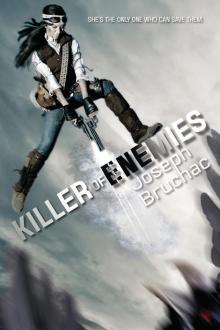 Killer of Enemies
Killer of Enemies Wabi
Wabi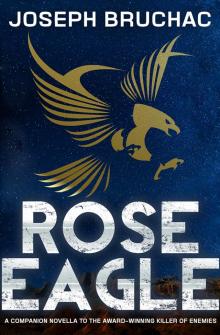 Rose Eagle
Rose Eagle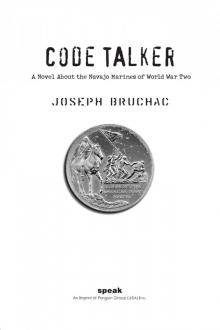 Code Talker
Code Talker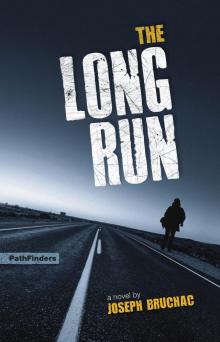 The Long Run
The Long Run Dragon Castle
Dragon Castle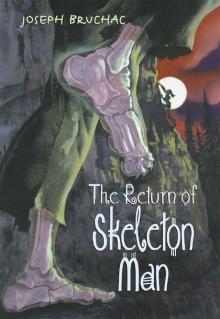 The Return of Skeleton Man
The Return of Skeleton Man Pocahontas
Pocahontas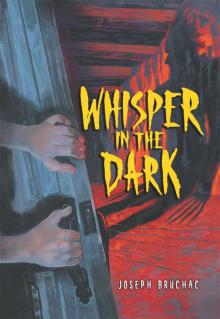 Whisper in the Dark
Whisper in the Dark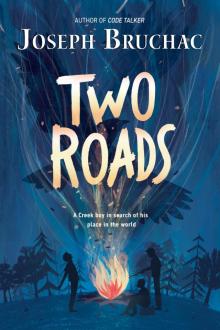 Two Roads
Two Roads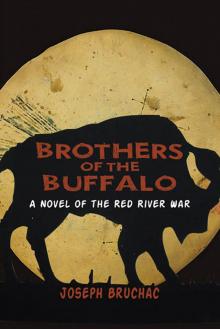 Brothers of the Buffalo
Brothers of the Buffalo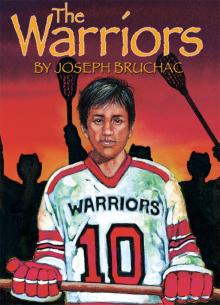 The Warriors
The Warriors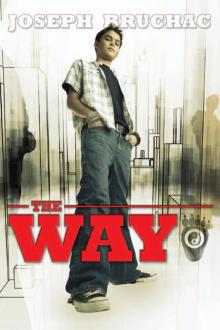 The Way
The Way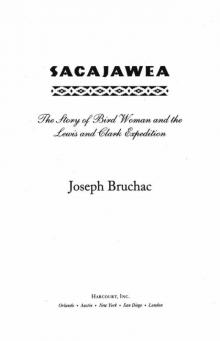 Sacajawea
Sacajawea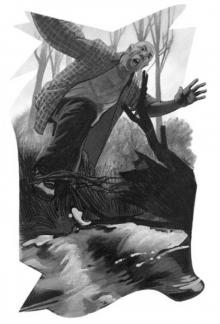 Night Wings
Night Wings March Toward the Thunder
March Toward the Thunder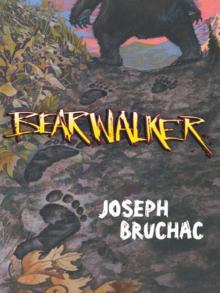 Bearwalker
Bearwalker Skeleton Man
Skeleton Man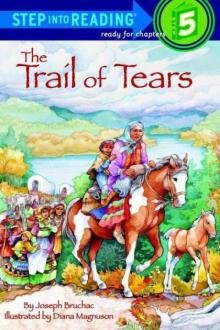 The Trail of Tears
The Trail of Tears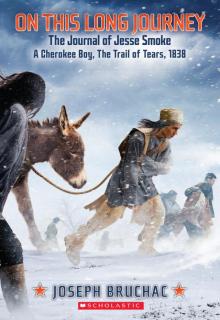 On This Long Journey
On This Long Journey Flying with the Eagle, Racing the Great Bear
Flying with the Eagle, Racing the Great Bear